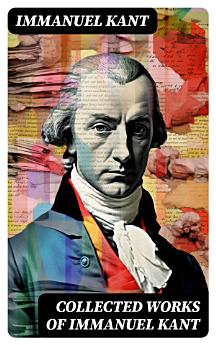Collected Works of Immanuel Kant: Complete Critiques, Philosophical Works and Essays
Immanuel Kant
Dec 2023 · DigiCat
Ebook
820
Pages
family_home
Eligible
info
reportRatings and reviews aren’t verified Learn More
About this ebook
The "Collected Works of Immanuel Kant" presents a comprehensive anthology of the philosopher's pivotal writings, encompassing his groundbreaking contributions to metaphysics, epistemology, ethics, and aesthetics. Kant's prolific prose is characterized by meticulous argumentation and a unique blend of rigor and accessibility, guiding readers through complex philosophical inquiries. The collection contextualizes Kant within the Enlightenment framework, showcasing his critical response to rationalism and empiricism, while his synthesis of these traditions laid the groundwork for modern philosophy. Immanuel Kant (1724–1804) stands as a towering figure in Western philosophy, whose ideas were shaped by the intellectual currents of his time, including the aims of the Enlightenment. A devoted scholar from Königsberg, Kant's interactions with contemporaries and a lifelong commitment to rational inquiry fueled his quest to unravel the nature of human experience and moral judgment. His life, marked by the tension between dogmatic tradition and emerging scientific thought, is reflected in the revolutionary ideas presented in this collection. This anthology is indispensable for scholars and students alike, offering a deeper understanding of Kant's influence on contemporary thought. The clarity of his insights into human reason, ethics, and aesthetics invites readers to engage with his work, encouraging thoughtful reflection on the philosophical questions that continue to shape our understanding of humanity.
About the author
Immanuel Kant (1724–1804), a central figure in modern philosophy, was a German philosopher hailed from Königsberg, Prussia (now Kaliningrad, Russia). His comprehensive and systematic work in epistemology, ethics, and aesthetics profoundly influenced all subsequent philosophy, especially the various schools of Kantianism and idealism. Kant's 'Critique of Pure Reason' (Kritik der reinen Vernunft, 1781), sought to establish the limits and scope of metaphysics, using a method that later became known as the 'Copernican Revolution' in philosophy. This foundational work was followed by the 'Critique of Practical Reason' (Kritik der praktischen Vernunft, 1788) and the 'Critique of Judgment' (Kritik der Urteilskraft, 1790), which investigated moral philosophy and aesthetics respectively. His notions of categorical imperative and the autonomy of the will are cornerstones of modern moral philosophy. Kant's influence extends beyond philosophy into political theory, with his work 'Perpetual Peace' (Zum ewigen Frieden, 1795) providing early ideas of democratic peace theory. His 'Collected Works' include all of his significant writings, such as 'Prolegomena to Any Future Metaphysics', 'Metaphysics of Morals', and a trove of other rigorous treatises blending his insights into the human experience with metaphysical inquiry. Kant's writing is characterized by a formal and ornate style, often constructing extended arguments through elaborate frameworks that have consistently challenged and enriched academic discourse. His enduring impact on various disciplines underscores his status as one of history's most eminent and pivotal thinkers.
Rate this ebook
Tell us what you think.
Reading information
Smartphones and tablets
Install the Google Play Books app for Android and iPad/iPhone. It syncs automatically with your account and allows you to read online or offline wherever you are.
Laptops and computers
You can listen to audiobooks purchased on Google Play using your computer's web browser.
eReaders and other devices
To read on e-ink devices like Kobo eReaders, you'll need to download a file and transfer it to your device. Follow the detailed Help Center instructions to transfer the files to supported eReaders.








